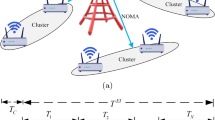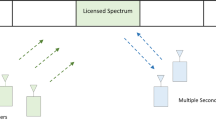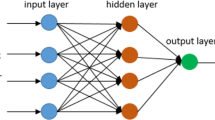Abstract
In this paper, we define a cluster based scheduling algorithm for Cognitive Radio Sensor Networks. To avoid inter-clusters collision, we assign fixed channels only to nodes having one-hop neighbors out of their clusters. We denote these nodes as specific nodes. Previous studies assign distinct channels to whole neighbor clusters to avoid inter-clusters collision. Our objective is to optimize the spatial reuse and to increase the network throughput while saving sensors energy. We start by assigning channels only to the specific nodes. Once the problem of inter-clusters collision is solved, each cluster head (CH) schedules the transmissions in its cluster independently. For the cluster members that are specific nodes, the CH assigns only time slots because the channel assignment is already done. For other cluster members (CMs) (not specific nodes), the CH assigns the pair (channel, slot). Two solutions are proposed in this paper to schedule the CMs: the Frame Intra Cluster Multichannel Scheduling algorithm denoted Frame-ICMS and the Slot Intra Cluster Multichannel Scheduling algorithm denoted Slot-ICMS. We evaluate the performance of these algorithms in case of accurate PUs activity detection and in case of bad PUs activity estimation. We prove that our proposals outperform an existing one especially in terms of energy saving.









Similar content being viewed by others
References
Abbasia AA, Younis M (2007) A survey on clustering algorithms for wireless sensor networks. Comput Commun 30:2826–2841
Asterjadhi A, Baldo N, Zorzi M (2010) A cluster formation protocol for cognitive radio ad hoc networks. In: IEEE wireless conference, pp 955–961. https://doi.org/10.1109/EW.2010.5483442
Gajanan H, Pingat SP (2016) Energy aware routing in next generation wireless networks using efficient resource allocation. Int J Sci Res:5
Gozupek D, Alagoz F (2009) Throughput and delay optimal scheduling in cognitive radio networks under interference temperature constraints. J Commun Netw 11:147–155. https://doi.org/10.1109/JCN.2009.6391389
Gozupek D, Alagoz F (2010) An interference aware throughput maximizing scheduler for centralized cognitive radio networks. In: International symposium on personal indoor and mobile radio communications, pp 1527–1532. https://doi.org/10.1109/PIMRC.2010.5671962
Gozupek D, Eraslan B, Alagoz F (2012) Throughput satisfaction based scheduling for cognitive radio networks. IEEE Trans Veh Technol 61:4079–4094. https://doi.org/10.1109/TVT.2012.2210257
Heinzelman W, Chandrakasan A, Balakrishnan H (2000) Energy-efficient communication protocols for wireless microsensor networks. In: 33rd Hawaaian international conference on systems science (HICSS)
Huang XL, Wang G, Hu F, Kumar S (2011) Stability-capacity-adaptive routing for high-mobility multihop cognitive radio networks. IEEE Trans Veh Technol 60:2714–2729. https://doi.org/10.1109/TVT.2011.2153885
Joshi GP, Kim SW (2016) A survey on node clustering in cognitive radio wireless sensor networks. Sensors (Basel):16
Kanungo T, Mount DM, Netanyahu NS, Piatko CD, Wu AY (2002) An efficient k-means clustering algorithm: analysis and implementation. IEEE Trans Pattern Anal Mach Intell 24:881–892. https://doi.org/10.1109/TPAMI.2002.1017616
Lazos L, Liu S, Krunz M (2009) Spectrum opportunity-based control channel assignment in cognitive radio networks. IEEE SECON, pp 1–9. https://doi.org/10.1109/SAHCN.2009.5168974
Li D, Gross J (2011) Robust clustering of ad-hoc cognitive radio networks under opportunistic spectrum access. In: IEEE international conference on communications, pp 1–6. https://doi.org/10.1109/icc.2011.5963426
Li X, Wang D, McNair J, Chen J (2011) Residual energy aware channel assignment in cognitive radio sensor networks. Wireless communications and networking conference, pp 398–403. https://doi.org/10.1109/WCNC.2011.5779196
Li X, Hu F, Zhang H, Zhang X (2012) A cluster-based mac protocol for cognitive radio ad hoc networks. Wirel Pers Commun 69:937–955
Li X, Wang D, McNair J, Chen J (2014) Dynamic spectrum access with packet size adaptation and residual energy balancing for energy-constrained cognitive radio sensor networks. J Netw Comput Appl 41:157–166
Liu S, Lazos L, Krunz M (2012) Cluster-based control channel allocation in opportunistic cognitive radio networks. IEEE Trans Mob Comput 11:1436–1449. https://doi.org/10.1109/TMC.2012.33
Mabrouk O, Idoudi H, Amdouni I, Soua R, Minet P, Saidane L (2014a) Oticor: Opportunistic time slot assignment in cognitive radio sensor networks. In: IEEE international conference on advanced information networking and applications, pp 790–797. https://doi.org/10.1109/AINA.2014.96
Mabrouk O, Minet P, Idoudi H, Saidane L (2014b) Conflict-free opportunistic centralized time slot assignment in cognitive radio sensor networks. In: IEEE international conference on high performance computing and communications, pp 421–427. https://doi.org/10.1109/HPCC.2014.72
Mabrouk O, Minet P, Idoudi H, Saidane L (2015) Intra-cluster multichannel scheduling algorithm for cognitive radio sensor networks. International wireless communications and mobile computing
Maleki S, Pandharipande A, Leus G (2011) Energy-efficient distributed spectrum sensing for cognitive sensor networks. IEEE Sens J 11:565–573. https://doi.org/10.1109/JSEN.2010.2051327
OFCOM (2009) Digital dividend: cognitive access consultation on licenceexempting cognitive devices using interleaved spectrum. http://www.ofcom.org.uk/consult/condocs/cognitive/cognitive.pdf
Ozger M, Akan OB (2013) Event-driven spectrum-aware clustering in cognitive radio sensor networks. IEEE INFOCOM, pp 1483–1491. https://doi.org/10.1109/INFCOM.2013.6566943
Pei E, Han H, Sun Z, S B, Zhang T (2015) Leauch: low-energy adaptive uneven clustering hierarchy for cognitive radio sensor network. EURASIP J Wirel Commun Netw
Ramli A, Grace D (2010) Rf signal strength based clustering protocols for a self-organizing cognitive radio network. In: International symposium on wireless communication systems, pp 228–232. https://doi.org/10.1109/ISWCS.2010.5624375
Rashid M, Hossain MJ, Hossain E, Bhargava VK (2009) Opportunistic spectrum scheduling for multiuser cognitive radio: a queueing analysis. IEEE Trans Wirel Commun 8:5259–5269. https://doi.org/10.1109/TWC.2009.081536
Rauniyar A, Shin SY (2015) A novel energy-efficient clustering based cooperative spectrum sensing for cognitive radio sensor networks. Int J Distrib Sens Netw
Sudhanshu T, Sudeep T, Neeraj K, Joel J (2015) Cognitive radio-based clustering for opportunistic shared spectrum access to enhance lifetime of wireless sensor network. Pervas Mobile Comput
Tragos E, Zeadally S, Fragkiadakis A, Siris V (2013) Spectrum assignment in cognitive radio networks: a comprehensive survey. IEEE Commun Surv Tutor 15:1108–1135. https://doi.org/10.1109/SURV.2012.121112.00047
Tumulura VK, Wang P, Niyato D (2011) A novel spectrum-scheduling scheme for multichannel cognitive radio network and performance analysis. IEEE Trans Veh Technol 60:1849–1858. https://doi.org/10.1109/TVT.2011.2114682
Tumuluru VK, Wang P, Niyato D (2010) An opportunistic spectrum scheduling scheme for multi-channel cognitive radio networks. In: IEEE vehicular technology conference fall, pp 1–5. https://doi.org/10.1109/VETECF.2010.5594393
Wei J, Zhang X (2010) Energy-efficient distributed spectrum sensing for wireless cognitive radio networks. In: INFOCOM IEEE conference on computer communications workshops, pp 1–6. https://doi.org/10.1109/INFCOMW.2010.5466680
Wu Y, Cardei M (2016) Multi-channel and cognitive radio approaches for wireless sensor networks. Comput Commun 94:30–45
Yau A, Ramli N, Hashim W, Mohamad H (2014) Clustering algorithms for cognitive radio networks: a survey. J Netw Comput Appl 45:79–95
Zhang H, Zhang Z, Dai H, Yin R, Chen X (2011) Distributed spectrum-aware clustering in cognitive radio sensor networks. In: IEEE global telecommunications conference, pp 1–6. https://doi.org/10.1109/GLOCOM.2011.6134296
Zhang Z, Yu F, Zhang B (2009) A depth-based TDMA scheduling for clustering sensor networks. In: International conference on frontier of computer science and technology, pp 261–266. https://doi.org/10.1109/FCST.2009.19
Author information
Authors and Affiliations
Corresponding author
Rights and permissions
About this article
Cite this article
Idoudi, H., Mabrouk, O., Minet, P. et al. Cluster-based scheduling for cognitive radio sensor networks. J Ambient Intell Human Comput 10, 477–489 (2019). https://doi.org/10.1007/s12652-017-0670-6
Received:
Accepted:
Published:
Issue Date:
DOI: https://doi.org/10.1007/s12652-017-0670-6




